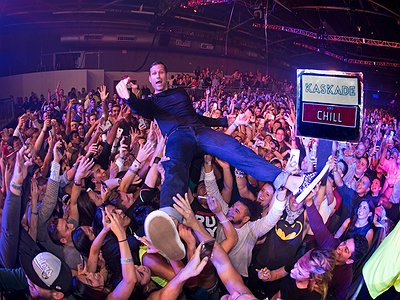Part 2
How would you describe your approach to building a set? What are some of the characteristics that define who you are as a DJ?
Something that is unique to me is that I’ve been writing songs, lyrics and melodies for so many years. I have scores of fans that have my lyrics tattooed on them. I have this catalogue to draw from that is 100% mine, that spans so many different moods. When I’m putting together a set, my goal is to be able to showcase these songs in a way that is unexpected, in a way that will sound new. I’m playing my music, but in a DJ’s form. It’s not a concert. Then I mix in other things that are congruent with what I’m doing in that moment.
This is what I’ve been doing for 25 years. Every day in the studio is preparation for a show. It all goes back to the showcase. This is what modern DJ’ing is. Showcasing the work.
It has today almost become customary to radically change pieces in the act of mixing and to increase the creative input of the DJ even to the level of the actual composition. What's your take on that and in how much do you make use of these possibilities yourself? Is there such a thing as 'disrespectful mixing'?
There’s no such thing as disrespectful mixing. That’s what’s so great about Electronic Music. We’re always ahead of the curve - the entire genre is disrespectful. This idea that pieces in music can’t be molded, changed and built upon doesn’t exist in my world - it’s cool when people make use of elements that have already been built, in ways that are unexpected. A new mix or what I call a mashup of a song is all done in the name of love of music. It’s to provoke emotion. That’s the point in creating music.
How do you see the balance between giving the crowd what they want and treating them to something new? What's your take on the idea of the DJ as an "educator" and is the relationship with the dancers a collaborative one or, as Derrick May once put it, a “battle”?
I am always walking that line. I see it more as a collaboration. The crowd will generally appreciate things in the long run, even if they don’t seem to be vibing on it in the moment. Maybe the immediate reaction isn’t huge, but it sticks. I remember when I played It’s You, It’s Me the first time, people just stared at me. They knew they were hearing something new. They were listening. This happened again when I debuted “Atmosphere” at Ultra in 2014. You could see by the looks on their faces that the audience wanted to sing along but it was new. So it was a moment of immersion, then by the end they had the chorus. We got there together.
It is customary for many DJs to also produce tracks of their own, thereby lifting the former 'division of labor' between the two. How do you feel about this – and in which way can both sides benefit from this? How does your work as a DJ influence your studio productions and vice versa?
These things go hand in hand. Some of my best material has been written after a late night in a club. In today’s world you can’t have one without the other. Anyone with a laptop can make tracks. If you’re doing no shows, you’re creating music in a black hole, you’re doing it for a different reason. And that’s 100% valid, but I find that the idea of sharing music helps me reach outside of myself for inspiration. I see hundreds of stories played out before my eyes every night I play. It’d be impossible to not be impacted by everything I experience.
Reaching audiences usually involves reaching out to the press and possibly working with a PR company. What's your perspective on the promo system? In which way do music journalism and PR companies change the way music is perceived by the public?
The biggest change I see is that everyone is trying to label sub-genres of music. Every record coming out is trying to say they’re part of a new genre. But they’re still trying to box it in. It’s tedious but it doesn’t change the industry. It’s just part of the music business.
It is remarkable, in a way, that DJing has remained relevant for such a long time. Do you nonetheless have a vision of DJing, an idea of what it could be beyond its current form?
I think we’re close to a world where production becomes so easy that a performer will literally be composing live sets. Almost like a concert pianist who is improvising. Twenty years from now people will be able to compose live. I think as we move forward the barrier between recorded electronic music and live electronic music will become lower and lower.
Find Kaskade online at www.kaskademusic.com






